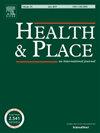美国跨性别女性健康的结构性驱动因素:一项全国性研究
IF 4.1
2区 医学
Q1 PUBLIC, ENVIRONMENTAL & OCCUPATIONAL HEALTH
引用次数: 0
摘要
住宅隔离和中产阶级化与各种健康结果有关。然而,这一领域的研究很少包括变性妇女,她们经历了充分记录的健康不平等。本分析旨在评估种族化经济隔离和中产阶级化对心理困扰和自评健康(SRH)的影响。方法美国398名跨性别女性在2021年6月14日至2022年5月1日期间完成了基线调查,并在12个月后进行了随访调查。社区层面的种族化经济优势和中产阶级化在邮政编码层面进行了测量,并将其分类。第一分位数反映了这些措施的最低水平。采用具有个体水平随机截断和稳健方差估计的多水平修正泊松回归模型来估计未调整和调整的种族化经济居住优势和士绅化与严重心理痛苦(Kessler-6≥13)和SRH(差/一般vs好/非常好/优秀)之间的关联。结果白人占57%,黑人占19%,拉丁裔占9%(任何种族)。种族化经济优势的最高分位数(相对于最低分位数)与严重心理困扰的风险增加相关(RR = 1.28;95% CI = 1.02, 1.61),较差到一般的SRH风险较高(RR = 1.51;95% CI = 1.10,2.08),而中产阶级化与两种结果均无显著关联。这些发现与先前的研究一致,表明少数群体可能不会从居住在社会和经济上更有利的社区中获得健康益处。未来的研究需要更好地了解在优势和劣势社区中可能暴露于变性恐惧症的跨性别女性的经历。本文章由计算机程序翻译,如有差异,请以英文原文为准。
Structural drivers of health among transgender women in the United States: A nationwide study
Introduction
Residential segregation and gentrification are associated with a variety of health outcomes. However, few studies in this area have included transgender women, who experience well-documented health inequities. This analysis sought to assess the effects of racialized economic segregation and gentrification on psychological distress and self-rated health (SRH).
Methods
398 transgender women in the United States completed a baseline survey between June 14, 2021 and May 1, 2022 and a follow-up survey 12 months later. Neighborhood-level racialized economic advantage and gentrification were measured at the ZIP code level and categorized into tertiles. The first tertile reflected the lowest levels of these measures. Multilevel modified Poisson regression models with individual-level random intercepts and robust variance estimation, were used to estimate unadjusted and adjusted associations of racialized economic residential advantage and gentrification with serious psychological distress (Kessler-6 ≥ 13) and SRH (poor/fair vs good/very good/excellent).
Results
Ethnoracial identities included 57 % White, 19 % Black, and 9 % Latine (of any race). The highest tertile of racialized economic advantage (vs the lowest) was associated with increased risk of serious psychological distress (RR = 1.28; 95 %CI = 1.02, 1.61) and higher risk of poor-to-fair SRH (RR = 1.51; 95 % CI = 1.10,2.08) in multivariable models, while gentrification showed no significant association with either outcome.
Discussion
These findings are consistent with prior research indicating that minoritized populations may not derive health benefits from residing in more socially and economically advantaged neighborhoods. Future research is needed to better understand the experiences of transgender women who may be exposed to transphobia in both advantaged and disadvantaged neighborhoods.
求助全文
通过发布文献求助,成功后即可免费获取论文全文。
去求助
来源期刊

Health & Place
PUBLIC, ENVIRONMENTAL & OCCUPATIONAL HEALTH-
CiteScore
7.70
自引率
6.20%
发文量
176
审稿时长
29 days
期刊介绍:
he journal is an interdisciplinary journal dedicated to the study of all aspects of health and health care in which place or location matters.
 求助内容:
求助内容: 应助结果提醒方式:
应助结果提醒方式:


